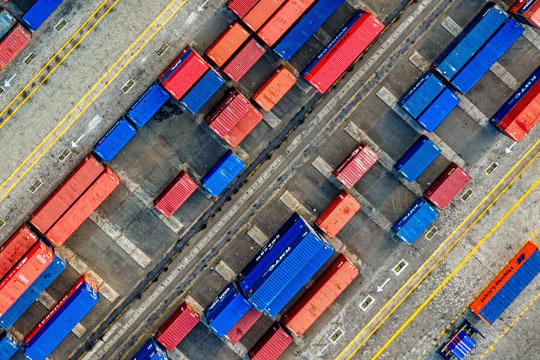Supply Chain Interruptions: What's Causing Them and What They Mean for Small Businesses
October 14, 2021

If you've been staying up to date with the latest news in the world of shipping and logistics, then chances are you've heard about worldwide supply chain interruptions. As a small business, you may think that these worldwide events don't impact you in the same way that they impact large companies with globe-spanning distribution networks.
While you'd be correct to assume that global supply chain interruptions don't affect the same way that they affect major corporations, you'd be wrong to assume that they don't affect your company. The truth is that the hurdles facing logistics professionals across the world have tangible impacts on your operation. In this article you'll gain a general understanding of the worldwide supply chain interruptions and their impacts as we explore the following topics:
- The Primary Causes of Supply Chain Interruptions
- The Impact of Supply Chain Interruptions on Small Businesses
- How Small Businesses are Minimizing the Impact of Supply Chain Interruptions
The Primary Causes of Supply Chain Interruptions
Those who have already taken the time to research the causes of the world's supply chain issues know that there's a lot of conflicting information on the internet. Some have pinned the cause exclusively on the COVID-19 pandemic, while others have noted that factors like the Suez Canal blockage and a shortage of shipping containers. In truth, each of these things plays a role in the struggles that global commerce is facing.
To help you better understand the ways in which each of these factors affects the worldwide supply chain, we've provided a brief explanation on the causes and impacts of each element.
COVID-19
As the most obvious factor of global shipping disruption, COVID-19's effects are wide ranging and even relate to the other causes we have yet to explore. The primary effects that COVID-19 has had on supply chains relate to workforce availability and travel restrictions.
As people have been quarantined and even become ill, many companies had to operate with a reduced workforce. This reduction in workforce left fewer crews for container ships, fewer workers at docks and warehouses, and even fewer professionals to help manage workloads. The cascading effects of COVID-19 are still rippling outwards and are expected to disrupt supply chains well into 2022.

Shipping container shortage
You may have heard that there's a shortage of shipping containers all over the world, but you may not know exactly why. While the primary cause of this shortage is related to COVID-19, which temporarily halted global shipping and created a backlog of goods that needed to be transported, coronavirus was not the only factor. Both 2020 and 2019 saw record numbers of lost containers due to rough seas and increased shipping volumes, these lost containers became yet another bottleneck, and doubly so once coronavirus halted the production of new containers.
To fully understand the impact of the container shortage it's best to envision a traffic jam where each car is a shipment. When COVID-19 struck and diminished workforces all over the world, several cars slammed on their brakes all at once. As you know, this doesn't just affect the cars that stopped, it affects every car behind them. When those cars finally start to move again, the miles long traffic jam takes a significant amount of time to clear. Much like a traffic jam, the shipments that have been delayed by a lack of containers are slowly starting to leave for their destination, while others are still waiting to be loaded onto a ship.
To compound the impact, some containers even ended up in incorrect ports. These containers, and the goods they hold, are now waiting to be redistributed to the correct destination, which has added an even greater burden on an already struggling global network.
Suez Canal blockage
The temporary blockage in the Suez is perhaps the only factor in the global shipping interruption unrelated to COVID-19. When the Ever Given blocked one of the world's busiest shipping routes, it delayed ships that were already in the canal and forced many others to sail around the southern tip of Africa. This added significant time to ship's voyages, delaying the delivery of goods and increasing the amount of time crews spent at sea. The effects of this delay are still being felt as logistics companies work back towards their preplanned shipping schedules.
Raw materials shortages
To top it all off, there's currently a raw materials shortage affecting a wide swath of industries. These shortages are partially a result of depleted workforces from COVID-19 but are also due to difficulties in finding areas where these raw materials can be extracted.
The most well-documented raw materials shortage, semiconductors, is an excellent example of both factors. Semiconductors are in short supply partially because production capacities were unable to keep pace with demand when COVID forced workers to stay home. With fewer workers, factories found it impossible to create the number of conductors needed to meet the exceptional demand. Additionally, rare earth mineral shortages are making it difficult to produce enough semiconductors even as COVID regulations loosen across the world.
The Impact of Supply Chain Interruptions on Small Businesses
When worldwide supply chain interruptions occur, small businesses have advantages and disadvantages. In some ways, small businesses are able to avoid significant, long-spanning impacts to their business model because of their more agile nature. A delayed shipment or incomplete order can be costly, but it's unlikely to alter the business's operating capacity beyond a few months.Unfortunately, being small also comes with its fair share of difficulty. When supply chain issues hit, suppliers often stick with the partners that are the most valuable, leaving smaller clients to fend for themselves.
We've seen both of these realities play out over the past 18 months of supply chain interruptions. Many small businesses were able to thrive as their lower inventory demands proved easier to meet, leaving the impression that nothing had gone awry. We've also witnessed many small businesses close their doors because they were unable to secure products from their suppliers.
Luckily, there are ways that small businesses can protect their interests and secure stability or even success.
How Small Businesses are Minimizing the Impact of Supply Chain Interruptions
Many small businesses have found ways to take advantage of their agility while reducing the threat of unfulfilled orders. Here are three ways that small businesses can minimize the impact of supply chain interruptions on their operation:
- Order Pooling: Some small businesses have taken to working with their local competition to pool together large orders under a single carrier. These large orders are more likely to be fulfilled as they prove more lucrative for both carriers and the company filling the order.
- Third-Party Logistics Providers: When their budget allows for it, small businesses often take advantage of third-party logistics provider (3PL) services. 3PLs help small businesses find a way to meet their inventory needs by leveraging their supply chain expertise to overcome obstacles.
- Quote Tools: Quoting tools, like the one here at Freightquote search through various carriers to find the best rate possible. While this doesn't impact the ability of goods to make it to your door, these tools can help you deliver products to your customers more quickly and affordably in a time when carriers are busier than ever. In a time of supply chain uncertainty, a great quote and a guaranteed carrier for your shipments is invaluable.
Overcome the Effects of Supply Chain Interruptions on Your Business
With strategies and tools like those mentioned in this article, you can put your business on the path to stability as supply chains move back towards standard capacity. Take the first step by filling out our quote form to lock-in an affordable price on your next shipment. We care about the success of small businesses, which is why we promise to provide you with the lowest quote price possible.

